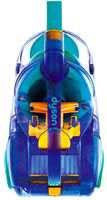Dyson High Court ruling sets new legal precedent

Dyson’s High Court action against Hoover, over copyright infringement, has resulted in the granting of the first post-expiry injunction in British legal history.
The High Court has ruled that upon the expiry this June of Patent Number EP (UK) 0042 723, which covers Dyson’s Dual Cyclone vacuum cleaner system, its rival Hoover should not be permitted to relaunch its Triple Vortex model for a further 12 months.
This post-expiry injunction on Hoover was made to offset time spent on the design and prototyping of the rival Triple Vortex system while the patent was in force.
A spokeswoman for Dyson explains that the ruling upholds the law forbidding the design of products using patented systems even if they are not for public consumption: “According to patent law you cannot infringe a patent, even behind closed doors.”
Such legal rulings are frequently applied to employees leaving one company and joining another, explains Simon Clark, partner at solicitor Theodore Goddard. This is to prevent a rival gaining an unfair advantage.
Clark says it is the first time he is aware of this “springboard principle” being applied to patent law, and agrees it is likely to set a legal precedent.
“The lesson here is that the granting of a patent effectively gives you a monopoly in exchange for sharing your information with the rest of the world.
“Designers need to be aware that they may be penalised if they do not respect the patent system, albeit behind closed doors,” adds Clark.
However, a second injunction filed against Hoover, for the name Vortex to be dropped from its recently launched Vortex Power model, was not upheld by the court .
“The court decided that the Vortex Power was not benefitting from the Dual Cyclone name”, says a Hoover spokesman.
The spokesman adds: “We will be rolling out some new products in the near future, designed by our in-house team.”
-
Post a comment




